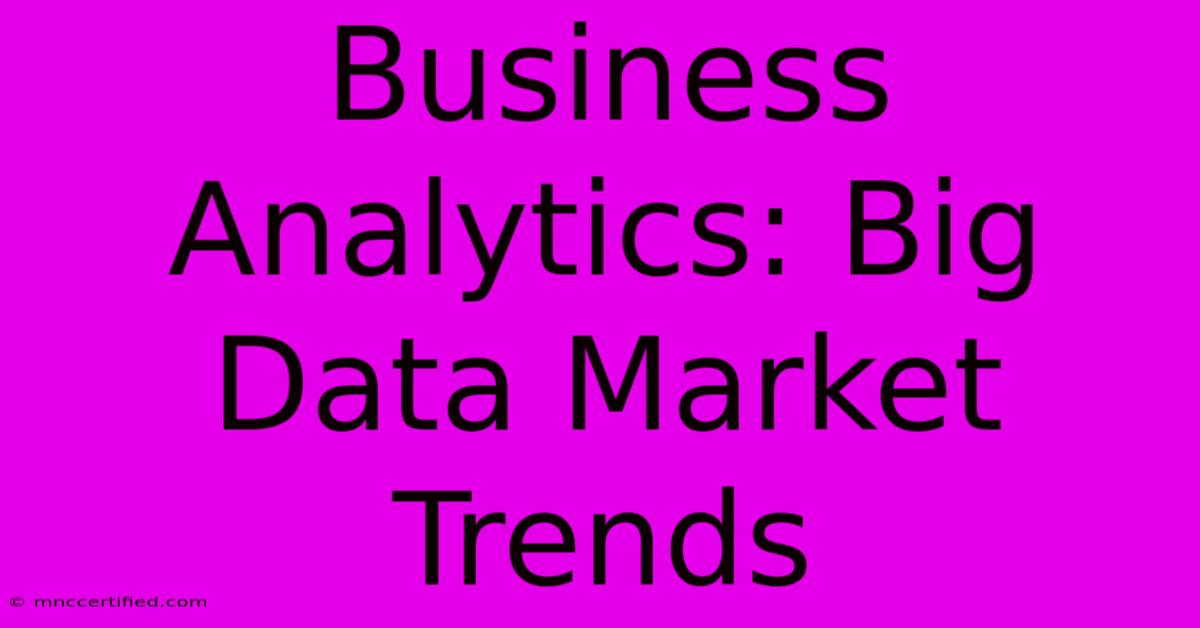Business Analytics: Big Data Market Trends

Table of Contents
Business Analytics: Big Data Market Trends
The business analytics landscape is rapidly evolving, driven by the explosive growth of big data and advancements in artificial intelligence (AI). Understanding these big data market trends is crucial for businesses seeking a competitive edge. This article delves into the key trends shaping the future of business analytics, offering insights for professionals and entrepreneurs alike.
The Ever-Expanding Universe of Big Data
The sheer volume, velocity, and variety of data generated daily are staggering. This big data explosion presents both challenges and opportunities. Businesses are grappling with how to effectively collect, store, process, and analyze this information to extract meaningful insights. This leads to a surge in demand for:
- Advanced analytics platforms: Solutions capable of handling massive datasets and performing complex computations are in high demand. This includes cloud-based platforms offering scalability and cost-effectiveness.
- Data scientists and analysts: Skilled professionals are needed to interpret data, build predictive models, and translate insights into actionable strategies. The shortage of qualified talent remains a significant challenge.
- Data visualization tools: Transforming complex data into easily understandable visualizations is critical for effective communication and decision-making. Interactive dashboards and intuitive reporting tools are becoming increasingly important.
Key Trends Driving the Big Data Market:
-
Artificial Intelligence (AI) and Machine Learning (ML): AI and ML are revolutionizing business analytics. These technologies enable businesses to automate tasks, identify patterns, make predictions, and personalize customer experiences at scale. AI-powered analytics is no longer a futuristic concept; it's a present-day reality driving significant market growth.
-
Cloud Computing: Cloud-based solutions are becoming the preferred choice for storing and processing big data. Their scalability, flexibility, and cost-effectiveness make them attractive to businesses of all sizes. Cloud analytics is streamlining operations and reducing infrastructure costs.
-
Internet of Things (IoT): The proliferation of connected devices generates vast amounts of data, offering valuable insights into operations, customer behavior, and market trends. IoT analytics is unlocking new opportunities for optimization and innovation.
-
Edge Computing: Processing data closer to its source (the "edge") reduces latency and bandwidth requirements, crucial for real-time analytics and applications demanding immediate insights. Edge analytics is gaining traction in industries like manufacturing and healthcare.
The Future of Business Analytics: Predictions and Opportunities
The future of business analytics looks bright, with several key trends poised to shape the market:
-
Increased Adoption of Predictive Analytics: Businesses are increasingly using predictive analytics to forecast future trends, optimize operations, and improve decision-making. This includes forecasting sales, identifying potential risks, and personalizing marketing campaigns.
-
Growth of Prescriptive Analytics: Moving beyond prediction, prescriptive analytics utilizes AI and optimization techniques to recommend optimal actions and strategies. This is transforming supply chain management, resource allocation, and customer relationship management.
-
Enhanced Data Security and Privacy: With the increasing volume of sensitive data, robust security measures and compliance with regulations like GDPR are becoming paramount. Data security is a critical concern and a major driver of innovation in the field.
-
Focus on Explainable AI (XAI): Understanding how AI models arrive at their conclusions is crucial for building trust and ensuring transparency. The development of explainable AI is addressing this critical need.
Conclusion: Navigating the Big Data Landscape
The big data market presents exciting opportunities for businesses willing to embrace the latest technologies and strategies. By leveraging the power of AI, cloud computing, and advanced analytics, businesses can unlock valuable insights, optimize operations, and gain a significant competitive advantage. Staying informed about these market trends is critical for success in today's data-driven world. Investing in skilled talent, robust infrastructure, and innovative solutions is key to harnessing the full potential of business analytics and navigating this dynamic landscape effectively.

Thank you for visiting our website wich cover about Business Analytics: Big Data Market Trends. We hope the information provided has been useful to you. Feel free to contact us if you have any questions or need further assistance. See you next time and dont miss to bookmark.
Featured Posts
-
Mulhern Taken Ill Hospitalized
Nov 30, 2024
-
Chiefs Fans Greet Pacheco
Nov 30, 2024
-
Typhoo Tea Enters Administration Acquisition Hope
Nov 30, 2024
-
E And O Insurance For Notary
Nov 30, 2024
-
Title Insurance Pikeville Ky
Nov 30, 2024